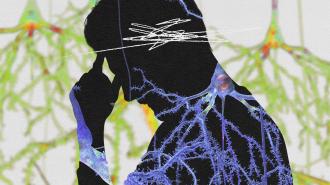The E4 variant of the apolipoprotein E gene (APOE4) is the strongest genetic risk factor for Alzheimer’s disease: One copy increases the risk of developing Alzheimer’s three- to four-fold, while two copies increase it 15-fold. The variant is present in up to half of individuals with the disease.
APOE4 was known to play a role in transporting cholesterol in brain cells, but its precise function was unclear. Now, research published in the journal Nature shows that it impairs the fatty tissue that insulates nerve fibers. The findings provide an insight into the mechanisms underlying memory loss in Alzheimer’s, and they offer new treatment strategies.
New insights into Alzheimer’s risk factors
Joel Blanchard of MIT’s Picower Institute for Learning and Memory and his colleagues examined post-mortem tissue from the prefrontal cortex of eight people who carried two copies of APOE4 and had been diagnosed with Alzheimer’s, twelve who carried one copy of the variant, and twelve non-carriers, who had two copies of APOE3.
The researchers used single-cell transcriptomics to measure gene expression levels in various cell types, including different types of neurons and glial cells. Comparing the scores from the three groups of samples, they identified 484 molecular processes or pathways that were perturbed by APOE4.
These included up-regulation of inflammatory and immune-related pathways; down-regulation of pathways involved in synaptic processes; and increased cellular stress and altered metabolism. These changes were seen not only in various types of neurons, but also in the different types of glial cells.
Further analysis identified 17 lipid-related processes altered by APOE4, including metabolism of steroids, fatty acids and triglycerides. Crucially, the variant also increased synthesis of cholesterol in glial cells oligodendrocytes, which form the fatty myelin tissue that insulates nerve fibers in the brain.
The observed changes occurred in a dose-dependent manner, with the tissue samples from Alzheimer’s patients exhibiting larger changes than those from people who carried one copy of APOE4.
The researchers also cultured human oligodendrocytes containing different forms of the APOE gene. Normally, cholesterol is transported to the plasma membrane, but in cells with APOE4, it accumulated in the organelles, causing an exaggerated stress response.
These cells also formed less myelin than cells without APOE4, likely because of reduced transport of cholesterol to their membranes. Myelination was, however, restored by cyclodextrin, a small molecule drug that promotes cholesterol transport.
Cyclodextrin also improved learning and memory in aged mice carrying two copies of APOE4, which exhibit accelerated neurodegeneration and Alzheimer’s-like symptoms.
Taken together, the results establish a clear link between APOE4, cholesterol, and myelin formation in the brain. They show how these factors combine to produce the memory loss characteristic of Alzheimer’s, and point to cholesterol synthesis and transport pathways as a promising target for new drugs to treat the disease.
This article was reprinted with permission of Big Think, where it was originally published.






